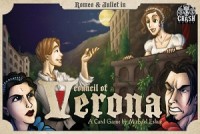
Council of Verona
The citizens of Verona have grown tired of the constant quarrel between the houses of Capulet and Montague. As ruler of the region, Prince Escalus has formed a council to help mediate the conflict and bring lasting peace to Verona.
In Council of Verona, players take on the role of influential citizens of Verona and act to use their influence to either add characters to the council or cast them into exile. Through thoughtful hand management of their cards and clever placement of influence tokens, players gain victory points based upon the agendas of the characters at the end of the game. The player with the most victory points wins!
We've all heard the story of Romeo and Juliet – now is your chance to steer the story and determine who will rule Verona once and for all!
User Reviews (1)
Add a Review for "Council of Verona"
You must be logged in to add a review.

Council of Verona is a fantastic card game that pack a lot of game into a small amount of components. Set in the world of Romeo and Juliet, players take on the challenge of using influence to fulfill agenda that will reward cunning players points. Though a small game, strategy can be quite heady and a lot of fun.
Components:
The game comes with 13 base game character cards, 4 additional cards for a five-player game, two location cards (The Council and Exile), and four influence tokens for each player. Along with this there are 5 player assistance charts showing all of the characters and abilities/agendas. All components are high quality and suite the game well. It is worth calling out the great looking sketch-like character art with unique drawings for each character.
There are two card types in the game – action cards and agenda cards. Action cards have a specific action that may be taken by the player (Move a character from one location to the other, look at influence tokens, swap influence tokens, etc). Agenda cards have an agenda in place of an action and three spaces for influence tokens. If the agenda is fulfilled any influence token on the agenda card is scored. If the agenda is not fulfilled, the influence tokens do not score points for their owner. Agenda examples include Romeo and Juliet are together (meaning in the same location), more Capulets than Montagues on the council, etc.
For a two player game, both players have influence tokens worth 0, 3, 4, and 5 points. For 3+ players the 4 token is removed from the game.
Gameplay:
Depending on the number of players in the game, a certain number of cards are dealt out of the game, a certain number of cards are dealt face down to each player, and a certain number of cards are drafted among players. This set up is great (especially if you are familiar with the game) because you never know what is in the game. Players then take turns playing a card in one of the two game locations, the council or exile, taking the action specified on the card just played (optional), and then placing one of their influence tokens face down on an open influence space.
The influence tokens and the strategy of their placement is what makes Council of Verona so intriguing. There is an element of bluffing that stems from the face that each player has a zero value token. As you watch other players weigh in on which agendas they place tokens on, you have to question if they really think that agenda will be fulfilled, or if they’re bluffing to lure you to place a high value on that agenda card as well.
Poison:
There is a small promotional expansion to Council of Verona called Poison that adds two influence token to each player’s arsenal – a poison token and an antidote poison. If a character card has more poison tokens than antidote tokens at the end of the round, that character dies. I mention the expansion only because is adds another layer to the game that take the level of bluffing to a whole new level. Not only are you worried about the zero token, but if a character dies, its agenda cannot be fulfilled. As an example, Romeo’s card is an agenda card that says “Romeo and Juliet are together” (meaning the same location). If at the end of the game R&J are together, but one of them is poisoned and dies, Romeo’s agenda is nullified because of the death. It’s little twists like this that double the strategy in Council of Verona. Though Poison is a little difficult to get your hands on, I highly recommend it.
Conclusion:
Council of Verona may fall into the category of micro game due to the small amount of components and the short length of time it takes to play. However, compared to other Micro games such as Love Letter or Lost Legacy, I found Council of Verona to have a higher level of strategic thinking and enjoyed the gameplay thoroughly. This gameplay is only enhanced by the small expansion Poison.